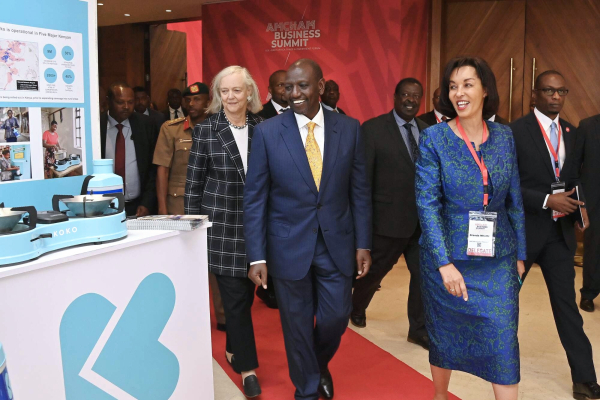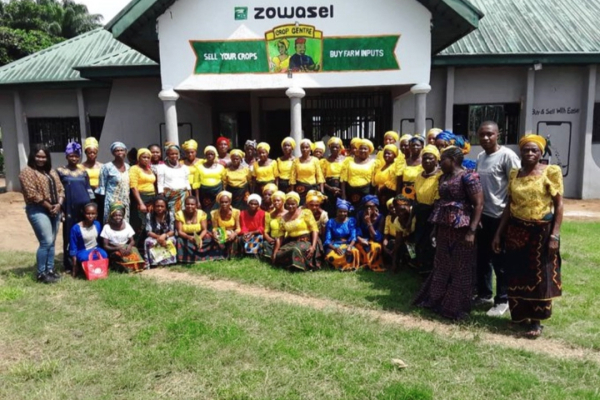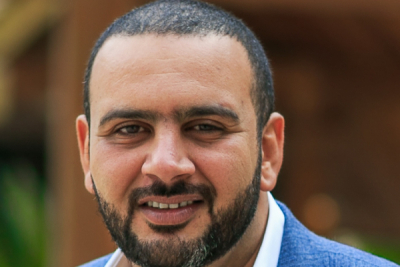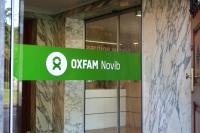With the global development of tech giants like Amazon, Facebook, and Netflix, the importation of digital services has significantly increased in Africa in recent years. To enable every country to benefit from the development, a global tax framework was elaborated. It is expected to become enforceable in January 2024.
Kenya will align its digital tax with the inclusive framework spearheaded by the Organization for Economic Cooperation and Development (OECD). President William Ruto (photo, center) announced this to investors on Thursday, March 30, at the American Chamber of Commerce Regional Business Summit.
“Following discussions with players in this sector, we have committed to review this tax regime and align it with the two-pillar solution currently being developed by the OECD inclusive framework,” President Ruto said.
The OECD finalized the reform of the international tax system aimed at solving tax base erosion and multinationals’ profit-shifting problems. The framework is based on two pillars, the first of which is to align tax rates more closely with local market engagement. To date, 138 jurisdictions have approved it.
Under the former administration, Kenya suspended its support for the global minimum tax rate, which would have seen the government suspend the collection of the digital services tax from tech giants such as Google, Facebook, and Amazon.
At the time, the country expressed its uneasiness with the terms of the agreement that would have seen the end of the digital services tax, which is currently 1.5% of sales made by foreigners in the country. After several negotiations, Kenya finally decided to align itself and sign the pact before its implementation on January 1, 2024.
According to OECD estimates, if Kenya joins, the tax authorities could collect between 3.3 billion shillings ($25 million) and 5.3 billion shillings in taxes, more than 10 times the 400 to 500 million shillings they currently collect each year in digital services tax.
In addition to Kenya, three other countries, namely Nigeria, Pakistan, and Sri Lanka have not yet signed the declaration.
Samira Njoya
Data science and artificial intelligence have improved processes and helped optimize results in several industries. Building on the opportunities they present, some Nigerian tech entrepreneurs decided to put them at the service of agriculture and online commerce.
Zowasel is a digital solution developed by a Nigerian startup. It enables smallholder farmers to use technology to improve their productivity, sustainability, and profitability across the value chain. The Lagos-based agritech startup that launched the solution was founded in 2019 by Jerry Oche and Oghenekome Umuerri. It aims to leverage data science and artificial intelligence to validate and secure the agricultural value chains, from farm to market.
To achieve that goal, it developed an Android app, which enables farmers to access its network of agronomy experts who evaluate productivity and strive to improve crop quality to attract good buyers.
Zowasel also checks buyers’ information such as their creditworthiness before connecting them to farmers. "We match buyers and sellers of the same commodity. [...] You decide on pricing and terms together, Zowasel enforces smart contracts and ensures that all transactions are shipped and payments are made after delivery without any issues," the platform indicates.
In 2021, the agritech startup claimed it was working with more than 1.5 million smallholder farmers in northern Nigeria. That same year, it secured $100,000 in funding from Guinness and Prosimador at the Zero Hunger Sprint 2021, an event held in Lagos and supported by the World Food Programme. Although it has launched operations in the Niger Delta to support smallholder farmers there, expansion outside Nigeria is not yet on its agenda.
Adoni Conrad Quenum
He is a former Deputy Minister of Investment and International Cooperation in Egypt. He is the brain behind several accelerators. He now runs an investment firm and financial services platform that supports fintech startups.
Shehab Marzban (photo) is an Egyptian entrepreneur and investor. He is the co-founder and managing partner of Camel Ventures, the first venture debt and fintech-focused investment firm in Egypt.
The investment firm, founded in 2020, partners with exceptional co-founders to help them build sustainable and high-growth businesses with regional and even global reach. It recently launched a $16 million fund focused on the Egyptian fintech startup ecosystem. The fund is regulated by the Egyptian Financial Regulatory Authority and offers equity investments for early-stage startups and local currency venture loans for later-stage startups.
“The success of the startup relies on the collective strength of all partners and stakeholders. We focus on our deep local knowledge, regulatory and business expertise, as well as our global outreach and network to support local champions while strengthening their growth on a regional and global level,” Camel Ventures said when announcing the VC fund.
Its managing partner, Shehab Marzban, graduated from Cairo University with a Master's in Operations Research and Decision Support in 2004. He received his Ph.D. in Information Systems and Operations Research from the University of Cologne in 2008 and did postdoctoral research in Islamic Economics and Finance at Durham University between 2009 and 2012. In 2015, he completed an executive program in venture capital at the Haas School of Business at the University of California, Berkeley.
In 2021, he founded Digital Finance Holding (DFin), a financial services platform that supports and promotes financial technology (fintech) companies in the non-bank financial services sector.
In 2012, he founded the crowdfunding company Shekra to support the education, legality, funding, mentoring, and monitoring processes of startups. In 2017, he also founded the entrepreneurship center Fekretak Sherketak, the investment company Egypt Ventures, and the accelerator EFG EV Fintech that focuses on fintech startups.
Formerly an external consultant on venture capital, micro, small and medium enterprises, and Islamic finance at the World Bank Group (2013-2015), he worked at Egypt's Ministry of Investment and International Cooperation for 4 years. First appointed as a senior economic advisor to the minister in 2015, he later held the positions of deputy minister and chief advisor to the minister there.
Melchior Koba
In 2019, the Moroccan government launched a national strategy to improve financial inclusion across the country. To achieve the objectives set in that strategy, the executives are working with public and private partners.
Last Friday, the World Bank’s board of directors approved a third Development Policy Loan (DPL) of $450 million for Morocco.
According to an IMF release dated April 3, 2023, this DPL aims to support the Moroccan government in the implementation of reforms to improve financial inclusion, digital entrepreneurship, and individuals and businesses’ access to infrastructure and digital services.
“This third financing is in line with the recommendations of the New Development Model (NDM), which emphasizes the need for a paradigm shift to promote inclusive, private sector-led growth to improve public services and reduce social and spatial disparities,” indicated Jesko Hentschel, Country Director for the Maghreb and Malta at the World Bank.
The first DPL, amounting to $500 million, was approved in 2020. In June 2021, a second one -$450 million- was approved. Combined with the new one, the total DPL secured by Morocco amounts to $1.4 billion.
It is a continuation of the $700 million financing the World Bank approved, in 2019, to support financial inclusion and the digital economy in Morocco.
The various funding enabled Morocco to significantly push back the barriers to financial and digital inclusion. Today, 44% of Moroccans have a bank account compared to 29% in 2017, and 30% of them use digital payments compared to 17% in 2017, the IMF release reported.
“The infrastructure for digital payments has expanded with 31% of rural districts now covered by mobile payment networks and 19 mobile payment providers in operation,” the IMF indicates.
Samira Njoya
Government-owned postal company SOPECO wants to become a leading player in the digitization of the country’s services. To achieve that goal, it is joining forces with technology partners specialized in the field.
The Indian group ATDXT will support the Congolese Posts and Savings Company (SOPECO) in the digitization of its activities. A partnership agreement was signed, Thursday, March 29, to this effect between the two companies to create a digital finance platform promoting savings and microlending.
"We aim to popularize these inclusive products that range from digital savings and wallets to micro-loans, through a digital platform [that can be used from] a telephone. This will allow consumers to for instance make purchases without using cash and resell services, generating additional income to sustain their business,” said Ludovique Mbossa (photo, right), SOPECO’s general manager.
Thanks to that agreement, SOPECO joins the Senegalese and Djiboutian state postal companies that have already taken steps to digitize their activities. Under that deal, a digital savings platform, "Nova digitale", will be set up for SOPECO to improve financial inclusion by promoting access to financing for individuals and SMEs that are still left behind.
This partnership comes four months after the agreement signed between the Indian group ATDXT and the Congolese Minister of Digital Economy, Léon Juste Ibombo, to support the country in the realization of several projects, the most important of which is the digitization of SOPECO.
Samira Njoya
The healthtech startup behind the solution was launched after a discussion, between its co-founders, on the lack of affordable healthcare in their country (South Africa). After that discussion, they decided to mobilize qualified healthcare professionals to find a solution to that challenge.
NOOSi is a healthtech solution developed by a South African start-up. It connects -virtually or in person- nurses to people who need home health care. The Cape Town-based healthtech was founded in 2021 by Sumarie Roodt and Catherine Williams to create a community where healthcare is accessible to all.
“NOOSi was started because we wanted to revitalize the South African healthcare system. We believe that this can be done by using a “tech4good” approach in a way that gives hardworking nurses new and better job opportunities and gives patients a way to get affordable and accessible healthcare,” explained Sumarie Roodt.
To access its services, users need to set up their NOOSI accounts through the solution’s web platform. The startup has a skilled workforce to perform every task, from chronic disease management care to mental and psychiatric care. The platform embeds a search bar where one has to fill in information such as the address of the potential patient, the services he/she needs, and the category of the service.
NOOSi always suggests the best nurse for every task since each of them is specialized in a particular area. When users select the nurse they want, they can contact them directly on Whatsapp to book their services. The rates applied depend on the services requested. Currently, the healthtech solution is only available in the Western Cape. The startup is typing to expand to other provinces before a possible international expansion.
Adoni Conrad Quenum
He is a biomedical engineer concerned with the protection of the environment in Africa and the world. He contributes his expertise to the cause through Kubik, a startup that transforms plastic waste into building materials.
Kidus Asfaw (photo) is an Ethiopian entrepreneur who graduated from Duke University with a bachelor's degree in biomedical and electrical engineering (in 2008). He is also a 2014 graduate of Princeton University with a master's in public affairs, development economics, and international affairs.
In 2021, he co-founded Kubik, an environmental startup which he serves as the CEO. His startup, founded in Kenya, gives a second life to hard-to-recycle plastic waste by turning them into low-cost and low-carbon building materials. Its ambition is to promote dignity through the construction of clean and affordable buildings for everyone and for every purpose -the materials can be used to build schools, clinics warehouses, and homes. On March 29, 2023, it was one of the two winners at the grand finale of the Global Startups Awards, considered one of the world’s biggest startup awards. Selected out of 120 tech companies from 115 countries, Kubik will thus have the opportunity to gain global recognition, explore new markets, access funding, and capitalize on an international network of leaders for its development.
Kubik is also one of the finalists of the 2023 Yale Africa Startup Review, a student- and alumni-led initiative that showcases founders and startups that are shaping Africa's future through entrepreneurship.
Before founding Kubik, Kidus Asfaw worked for UNICEF for over seven years. He joined the organization in 2014 as the product manager of the Global Innovation Centre in Uganda. Between 2017 and 2021, he was also UNICEF Uganda’s head of technology and innovation partnerships.
The entrepreneur has also worked in several other companies or institutions such as Accenture, where he was a technology manager between 2010 and 2012, and the World Bank where he was an innovation consultant from 2013 to 2014.
Melchior Koba
The fintech solution was launched by founders with over 20 years of experience in the African financial sector. With their experience in the industry, they know the challenges faced by populations when accessing the services offered by traditional financial institutions. So they set Carbon to address those challenges.
Carbon is a fintech solution developed by the Nigerian start-up OneFi. It allows access to digital banking services. The startup behind the solution is based in London and Lagos. Founded in 2012 by Chijioke Dozie and Ngozi Dozie, it has raised over $15 million in VC funding to accelerate its growth in Africa.
Through its mobile app -available for Android and iOS devices, users can register their account in just a few minutes and start accessing its services. Carbon also has a USSD code for potential users living in areas with no or poor access to the internet.
Among other things, the fintech allows users to pay bills, transfer money or get loans instantly. It has even integrated a feature that allows users to exchange messages when closing deals.
Every deposit on the platform is insured by the Nigeria Deposit Insurance Corporation. In other words, the insurance company protects depositors and guarantees the settlement of insured funds should the fintech solution become unable to refund deposits. In 2021, it signed a contract with Visa to issue digital and physical debit cards.
“Carbon is focused on delivering an unparalleled banking experience that is both safe and reliable across all touchpoints.[...] We want more customers to enjoy some of our popular products like Carbon Zero through their Carbon card, and the key to achieving this is our partnership with a leading payment and fintech-friendly company like Visa,” said Chijioke Dozie at the time.
In 2020, the fintech claimed about 659,000 customers and over $241.35 million in transactions processed. In addition to Nigeria, Carbon has a presence in Kenya and Ghana. Its ambition is to become a pan-African digital bank for Africans and the diaspora. The Android version of its app has already been downloaded more than a million times.
Adoni Conrad Quenum
In Nigeria, only a few states have access to reliable and affordable Internet. To address this deficit, the federal government is stepping up actions such as setting up and funding digital projects.
The Nigerian government on Wednesday (March 29) agreed to provide free broadband Internet access in 75 public places, including 20 airports, several tertiary institutions, and six marketplaces in the 36 states of the Federation. The Federal Executive Council of Nigeria (FEC) approved two contracts worth N24.20 billion ($52.5 million) for that purpose.
According to Digital Minister Isa Ali Pantami, the cost of providing broadband infrastructure to tertiary institutions and airports is N18.95 billion, while the second approval to provide broadband to selected markets is N5.25 billion.
“We want to ensure that students and staff benefit from unlimited internet. For airports, we know the difficulty when you land without any connectivity,” said Isa Ali Pantami.
“[...] for markets, it’s to support innovation-driven enterprises that are being championed by the Massachusetts Institute of Technology, where we try to give global visibility to our innovators, to our micro, small and medium enterprises, so that their market is not going to be narrowed and restricted only to our local communities,” he added.
The funding will finance the 2nd and 3rd phases of a broadband infrastructure project launched by the federal government. In 2019, the FEC approved a memo for the unlimited provision of Internet in 18 universities under the first phase of the project.
The said project is in line with the Nigerian National Broadband Plan 2020-2025, which aims to increase broadband penetration to 70% nationwide.
Samira Njoya
In Africa, poor access to financing remains an obstacle to the development of startups operating on the continent. VC Funds are being launched to address that issue and help them grow in underserved markets.
Dutch investment firm Goodwell Investments and Dutch foundation Oxfam Novib announced, Friday, the launch of "Pepea", a joint €20 million ($21.7 million) fund focused on financing early-stage East African startups, specifically in Kenya, Uganda, and Ethiopia.
According to the statement released by Goodwell Investments, the fund will focus on companies in the sustainable agriculture, energy, mobility, logistics, and waste management sectors.
"We acknowledge the challenges faced by SMEs in the region (especially those that are women-owned) in accessing fine-tuned patient capital and we now want to play a role to address those needs," said Tamara Campero, investment manager at Oxfam Novib.
In an analysis published on June 14, 2022, Africa: The Big Deal informed that East Africa was one of the regions with a sufficiently developed venture capital ecosystem on the continent. It attracted nearly 23% of the funds raised by African startups since 2019. Kenya alone attracted most of the funding, nearly $1.9 billion in two and a half years.
By launching "Pepea," Goodwell Investments and Oxfam Novib want to further develop the region and support startups that are generating revenue but have not yet raised funds. Pepea will ensure that the companies it selects have the right structures and systems to attract more financing.
Samira Njoya
More...
He gained visibility with the trade and investment promotion events he organized around the world. He then founded an international trade platform to enable local producers and traders to expand their export reach to the rest of the world.
Vital Sounouvou (photo) is a Beninese entrepreneur and trade and investment advisor. He holds a bachelor's in telecommunications and software engineering from the IUT in Calais, France, and a business management certificate from the University of Texas at Austin. He is renowned as the founder and CEO of Exportunity Group, an event management and trade promotion group.
Founded in 2012, Exportunity Group built its reputation as an event management and trade promotion company in West Africa, the United Arab Emirates, the United States of America, South Africa, and many others. The trade promotion activity played a crucial role in building the company's reputation and expanding its professional network.
In 2015, together with his team, Vital Sounouvou launched Exportunity.net with the goal of helping small African businesses expand their customer base and benefit from a secure payment system. The e-commerce platform was available to customers through a network of more than 700 outlets in West Africa until its closure in 2019.
In 2016, the entrepreneur explained that Exportunity came from the realization that despite the fairs he used to organize, he was still not connecting local producers with “big buyers.” “I organized fairs but I still did not solve the problems of these producers. In fact, in most sub-Saharan African countries there is no bridge between big buyers, people who can pay 100 containers of rice per month, and local producers. To observe this gap launched me in this adventure that is today Exportunity and still drives me every day,” he said.
Building on that drive, even when Exportunity was to be shut down, he launched another platform RayOn that has already been tested by over 800 firms across Africa. With its user-friendly interface, the new platform offers SMEs online shops to promote their businesses and a mobile app to manage sales and deliveries in real-time. RayOn also offers training for selected SMEs operating on its platform and funds their marketing campaigns.
In 2017, through Exportunity, he introduced the "XportCARD" Visa card in Benin, in collaboration with the United Bank for Africa. The cards were designed to help small and medium-sized businesses seeking an international payment solution securely conduct financial transactions globally. As of January 2022, XportCARDs was claiming over 6,300 active users and more than $80 million in transactions processed.
A 2014 Mandela Washington and 2015 Tony Elumelu Entrepreneurship Fellow, Vital Sounouvou is a 2016 Forbes Africa 30 under 30 list honoree.
Melchior Koba
With African countries progressively moving towards the fourth industrial revolution, businesses need to adopt digital solutions in their development strategies since such tools are crucial to making them sustainable.
IT solutions provider ZTE Corporation and South African systems integrator BCX recently signed a strategic cooperation agreement to promote the deployment of digital solutions in South Africa.
The agreement, signed on the sidelines of the Mobile World Congress 2023 (MWC 2023), was disclosed in a release published by ZTE last Thursday.
“BCX takes a deep dive into Africa and the Middle East, and has made great achievements in regional digitalization. The strategic cooperation between ZTE and BCX can achieve complementary advantages. ZTE and BCX will bring about more changes and market opportunities in the industry’s expansion and help accelerate the regional digitalization process,” said Zhang Wanchun, SVP and General Manager of the Wireless Product Operation Division at ZTE.
In recent years, digital solutions have become essential to pinpoint consumers’ interests and developing businesses. According to a McKinsey & Company report on the future of work, “digitization and automation could result in a net gain of up to 1.2 million jobs in South Africa by 2030.”
Through their strategic agreement, BCX and ZTE aim to cooperate to further develop the digital infrastructure in South Africa, including servers, storage, private 5G, data center infrastructure, and private clouds. With this agreement, BCX becomes an official channel partner of ZTE in the South African enterprise network market.
Samira Njoya
The rapid population growth has caused major problems with urban transport in major African cities. Between traffic jams and the quality of road infrastructure, Some find it wiser to take traditional transport means: cab taxi.
SafeBoda is a digital solution developed by a Ugandan startup. It is, among other things, an on-demand urban transport and financial service. The Kampala-based startup behind the solution was founded in 2015 by Ricky Rapa Thomson, Alastair Sussock, and Maxime Dieudonné.
According to the startup, “right from day one, SafeBoda has been [the] safest option for affordable rides within the city. Innovation being one of its core values, and now with the Bank of Uganda license, SafeBoda is creating a whole lot more value for its community of customers and drivers in Uganda.”
Through its Android and iOS apps, users can create their accounts to access its services. The solution that was only for on-demand cab taxi service introduced car transportation and now offers additional services including last-mile delivery, e-commerce, fee-free money transfers, bill payment, etc.
“We are building a global product that is going to be available in cities across Africa…and SafeBoda will continue to build better services that will allow us to serve the population better and grow beyond Uganda so that anyone in Africa will have access to services just by clicking a button. We will also make sure that the lives of our drivers are improved,” says Ricky Rapa Thomson.
Users can pay for their rides and services via the integrated SafeBoda wallet that can be loaded by mobile money, agents, and even drivers. The startup even offers up to 10% interest on unused funds in users’ wallets.
The startup said that in Kampala alone, it has achieved over 30 million safer rides. Building on that achievement, it started its continental expansion, launching in countries like Nigeria and Kenya.
According to Play Store, the Android version of the super application has already been downloaded more than a million times. Despite fierce competition from international firms like Uber and Bolt in the on-demand transportation segment and Jumia in e-commerce, SafeBoda is not wavering. Although it had to pull out of the Kenyan and Nigerian markets for various reasons, it is focusing on its growth in Uganda to re-launch a new expansion plan in the coming years with its investors’ support.
Adoni Conrad Quenum
He is a full-stack developer and an artificial intelligence and robotics researcher. With Guzo Technologies, he develops the Internet of Things (IoT), virtual reality, and prototyping solutions.
Daniel Getachew (photo) is the founder and CEO of Guzo Technologies. He graduated from Madaa Walabu University with a bachelor's in computer science in 2014 and from Adama Science and Technology University with a master's in software engineering. He also holds a Ph.D. in Artificial Intelligence and Robotics from the Addis Ababa Science and Technology University.
His company, Guzo Technologies, born in 2019, is a computer and media services startup based in Ethiopia. It focuses on virtual and augmented reality and the Internet of Things (IoT) solutions. It uses world-class game engines and develops CGI-based virtual tours with fun content. Apart from designing, developing, and prototyping IoT products, it also develops enterprise software.
On March 30, 2023, the company was selected as one of the six winning startups in the NINIJA accelerator program, which aims to support outstanding startups that address social issues in Ethiopia. As part of the program, it will undergo a proof of concept test with the Japan International Cooperation Agency (JICA) and receive four months of business development training.
The product that brought Guzo Technologies to the limelight is Guzo Maps, a virtual application that gives users the ability to interactively explore historical sites and places of interest in Ethiopia.
The man behind these achievements, Daniel Getachew, is also known as a member of Epic Games’ Unreal Engine developer community. He is also a contributor and Basic4X community member at mobile platform development tools publisher Anywhere Software.
Between 2015 and 2017, he worked as a computer vision and robotics researcher at Adama Science and Technology University. At the same time, he was the director of the TV series Hellotech on JTV Ethiopia. He held various technical positions at Gebeya, a recruitment technology start-up, between 2017 and 2020.
Between 2020 and 2021, he was the technical director of Globetrotter VR, a virtual reality company. Then, in 2022, he was hired again by Gebeya as a cybersecurity awareness trainer.
Melchior Koba















